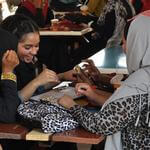Darfur crisis: The role of traditional leaders in dealing with violence against women
How to cite this publication:
Yousif Takana (2014). Darfur crisis: The role of traditional leaders in dealing with violence against women. Bergen: Chr. Michelsen Institute (CMI Sudan Working Paper SWP 2014:4)
The armed conflict between the Sudan government and rebel groups in Darfur erupted in 2003. Escalating violence included sexual assaults on women. Many women who have been raped live with a stigma, or are forced to get divorced and care for their “illegal” children. After a number of aid organizations were expelled from Darfur, civil society organizations and the traditional leadership were called upon to protect women from sexual violence. This paper explores the role of traditional leaders. It argues that customary practices do not provide women with any protection as compensation is given to their families and they suffer from marginalization and further violence. Similarly, children born after rape are not protected from social exclusion and are thought of as illegal. Accordingly, many women are deprived of their basic rights and the role of traditional leaders in protecting them remains very limited.


